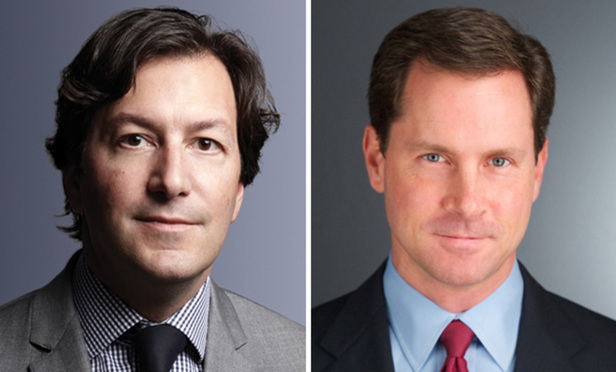H. Christopher Boehning

January 31, 2022 | New York Law Journal
Courts Reject Speculative Requests for 'Discovery on Discovery'A recent set of cases demonstrates that judges are well aware of the dance between adversaries and have established a set of standards to determine when requests labeled "discovery on discovery" are appropriate.
By H. Christopher Boehning and Daniel J. Toal
7 minute read

December 06, 2021 | New York Law Journal
Court Applies Proportionality in Determining Privilege Log BurdenDecisions like 'Triaxx', discussed by Christopher Boehning and Daniel J. Toal in this edition of their Federal E-Discovery column, demonstrate the versatility of proportionality principles and their potentially wide-ranging applicability in the discovery context.
By H. Christopher Boehning & Daniel J. Toal
9 minute read

October 04, 2021 | New York Law Journal
Court Determines iPhone Evidence To Be Fabricated, Dismisses CaseIn this edition of their Federal E-Discovery column, H. Christopher Boehning and Daniel J. Toal discuss a recent decision from the Southern District of New York, where the defense's adept handling of key evidence they suspected had been fabricated resulted in severe sanctions against the plaintiff and her counsel, including a dismissal with prejudice.
By H. Christopher Boehning and Daniel J. Toal
7 minute read

August 02, 2021 | New York Law Journal
Embracing Proportionality, Court Refuses To Compel Discovery 'Based on Relevance Alone'In this edition of their Federal E-Discovery column, H. Christopher Boehning and Daniel J. Toal discuss a recent decision that serves as a reminder of the fundamental importance of proportionality post-2015, when allowable discovery is not determined by relevance alone.
By H. Christopher Boehning and Daniel J. Toal
7 minute read

April 05, 2021 | New York Law Journal
Court Denies Request To Compel Discovery of Slack MessagesAs text and app messaging and online communication platforms such as Slack continue to supplement—and supplant—email communications in the workplace, parties and courts need to consider these technologies' impact on document preservation and production obligations. A recent decision provides clues on how courts may treat such electronically stored information. Christopher Boehning and Daniel J. Toal discuss the case in this edition of their Federal E-Discovery column.
By H. Christopher Boehning and Daniel J. Toal
9 minute read

February 01, 2021 | New York Law Journal
ESI Protocol Outweighs FRCP Proportionality Protections, Court SaysIn this edition of their Federal E-Discovery column, H. Christopher Boehning and Daniel J. Toal discuss 'In re Valsartan', which demonstrates that parties must negotiate ESI protocols with care and that understanding and negotiating such protocols are key to information discovery practice.
By H. Christopher Boehning and Daniel J. Toal
10 minute read

October 05, 2020 | New York Law Journal
Endorsing TAR, Court Confirms Responding Party Can Determine Its Own Search and Review MethodologyThis Federal E-Discovery column by H. Christopher Boehning and Daniel J. Toal discusses the court's recent guidance on the use of technology-assisted review as part of e-discovery.
By H. Christopher Boehning and Daniel J. Toal
7 minute read

August 10, 2020 | New York Law Journal
Court Orders Cost-Shifting for 'Needlessly Overbroad' DiscoveryThis Federal E-Discovery column by H. Christopher Boehning and Daniel J. Toal discusses a recent decision that brings renewed attention to the possibility of cost-shifting under Rule 26(c), and addresses when it may be appropriate.
By H. Christopher Boehning and Daniel J. Toal
10 minute read

June 01, 2020 | New York Law Journal
'Staggering' Spoliation Leads to Case Terminating SanctionsA district court recently found some actions taken while under a duty to preserve indicative of intentional spoliation, including the company and CEO's use of ephemeral messaging, the failure to disable auto-deletion of emails, and the reformatting and other spoliation of devices allegedly used to transfer trade secret information. In their Federal E-Discovery column, H. Christopher Boehning and Daniel J. Toal discuss how the clearly frustrated court issued case terminating sanctions for this "staggering" discovery misconduct.
By H. Christopher Boehning and Daniel J. Toal
8 minute read

April 06, 2020 | New York Law Journal
Confidentiality Order Sufficiently Protects EU Data in U.S. DiscoveryIn their Federal E-Discovery column, Christopher Boehning and Daniel J. Toal discuss a recent case in which the court conducted a comity analysis and issued a decision that confirmed the value of a protective order when producing names and positions in response to a discovery request—information considered benign by U.S. discovery standards, but protected under international data privacy laws.
By H. Christopher Boehning and Daniel J. Toal
8 minute read
Trending Stories
- 1The Fearless Forecaster’s Employment Law Predictions for 2025
- 2Judicial Conference Declines Democratic Request to Refer Justice Thomas to DOJ
- 3People in the News—Jan. 2, 2025—Eastburn and Gray, Klehr Harrison
- 4Deal Watch: Latham, Paul Weiss, Debevoise Land on Year-End Big Deals. Plus, Mixed Messages for 2025 M&A
- 5Bathroom Recording Leads to Lawyer's Disbarment: Disciplinary Roundup
More from ALM
- Scan In Progress: Litigators Leverage AI to Screen Prospective Jurors 1 minute read
- Legal Speak at General Counsel Conference East 2024: Match Group's Katie Dugan & Herrick's Carol Goodman 1 minute read
- Legal Speak at General Counsel Conference East 2024: Eric Wall, Executive VP, Syllo 1 minute read



